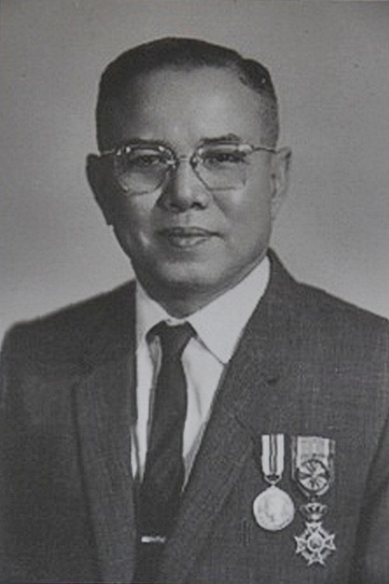Sirivejjabhandu, Boonpong
- Date of birth:
- April 21st, 1906 (Kanchanaburi, Thailand)
- Date of death:
- January 29th, 1982 (Thailand)
- Nationality:
- Thai
Biography
Boonpong Sirivejjabhandu, better known by his name "Boon Pong" played an important role in Thailand in assisting the prisoner of war forced laborers on the death railway from Burma to Thailand.
in Kanchanaburi he ran a food store (called 'Boonpong&Brothers') on Pak Prak Road, which also housed a Japanese headquarters, hotel and hospital during the war.
He sailed a small boat on the Kwai Noi River to sell goods, including to the Japanese in the labor camps. Here he got to know Edward "Weary" Dunlop and the horrific conditions in the camps.
The (later Sir) Edward "Weary" Dunlop was a surgeon in the Australian Army. In early 1942 he was transferred to Java where he was taken prisoner of war by the Japanese in February. Later, the Japanese transferred him, along with a 1000-strong group of Australians, to Singapore to perform forced labor on the death railway. 'Weary' had a large part in the organization of that group of Australians. He did good medical work such as many necessary leg amputations. There also began his collaboration with Boon Pong, which he explained in detail in a speech in 1981 at the cemetery in Kanchanaburi.
The forced laborers on the death railway were divided into two groups. A good estimate indicates that 90,000 western prisoners of war were employed there. The number of Asian forced laborers (called 'romusha', 'laborer' in Japanese) is much less certain, but most estimates are from 200,000 to 250,000 people. Both groups suffered from disease and malnutrition. Mortality was high, and more so among the romushas. There are individual reports of Thai residents helping the romushas on a small scale, but not much is known about this. The story goes that the forced laborers were allowed to bathe in the Kwae Yai River where the inhabitants left fruit and hard-boiled eggs on the banks. It is different with the support for the prisoners of war.
The role of Boon Pong:
Boon Pong soon started providing assistance to the camp inmates. He smuggled food and medicine into the camp. He supplied parts for the illegal radio of 'Weary' and brought flashlights. Camp residents gave him notes that he tried to forward. He also relayed intelligence to the Allies which is reported to have aided in the bombing of the bridge over the Kwae River. The camp inmates entrusted him with valuables such as watches and jewelry that he paid for and kept. After the war he gave them back.
Boon Pong bribed Japanese military pharmacists to get more drugs. He was in contact with a resistance organization in Bangkok called V Organization (possibly expats from neutral countries), who gave him money to buy food and other items for the camp inmates. All these activities involved great risks. He risked his own life to save many hundreds of lives.
Also in Ubon Rachathani there was a Thai resistance/aid organization led by Lai Sirirohtor, nicknamed 'Little Mother'. The villagers helped allied prisoners of war there, and after the end of the war also Japanese prisoners of war.
After the war
In 1945-46, Boon Pong played a key role in the transfer by the Thai government of the land for the construction of the two major military cemeteries in Kanchanaburi and Songkhla. These lands were transferred 'forever' to the Commonwealth War Graves Commission (CWGC). During the construction of the GWCC site in Kanchanaburi, the inter-allied burial and identification team – which also included Dutch people – had been housed for some time in a building owned by Boonpong's family. From this building, the excavations were conducted in the area between Nong Pladuk and the Three Pagoden Pass on the Thai-Burmese border.
Boon Pong was seriously injured in a shooting by police in 1947. The cause is unclear. He was then financially completely grounded. It was 'Weary' who organized a fundraiser among former Australian prisoners of war and pleased Boon Pong with £30,000 which enabled him to start a bus company.
In the years immediately after the war, Boon Pong was not a problem in its own country. He was really only known and loved in Kanchanaburi. That changed later. He was awarded a Thai royal decoration.
The Quiet Lions is a 2006 documentary that chronicles the friendship between Weary and Boon Pong. In 2013, the TV channel ThaiTBS aired a documentary 'A War Hero Named Boon Pong'. And in 2017, performers performed in a Boon Pong musical in Kanchanaburi.
Let me also mention the "Weary Dunlop-Boon Pong Exchange Fellowship". Funded by the Australian government, it provides scholarships to Thai doctors to continue their studies there.
Boon Pong passed away on January 29, 1982. Weary passed away in 1993. Ten thousand people watched the funeral procession in Melbourne.
The ThaiPBS documentary film about Boon Pong, unfortunately only in Thai but gives a good picture of that time.
Research by: Tino Kuis and Lung Jan
Do you have more information about this person? Inform us!
- Period:
- Second World War (1939-1945)
- Awarded on:
- October 20th, 1950
Royal decree no. 17
- Period:
- Second World War (1939-1945)
Sources
- Photo 1: Wikipedia (Public Domain)
- - A War hero named Boonpong of Deathrailway (Thai language).
- Nationaal Archief 2.05.246 inventarisnummer 329.




